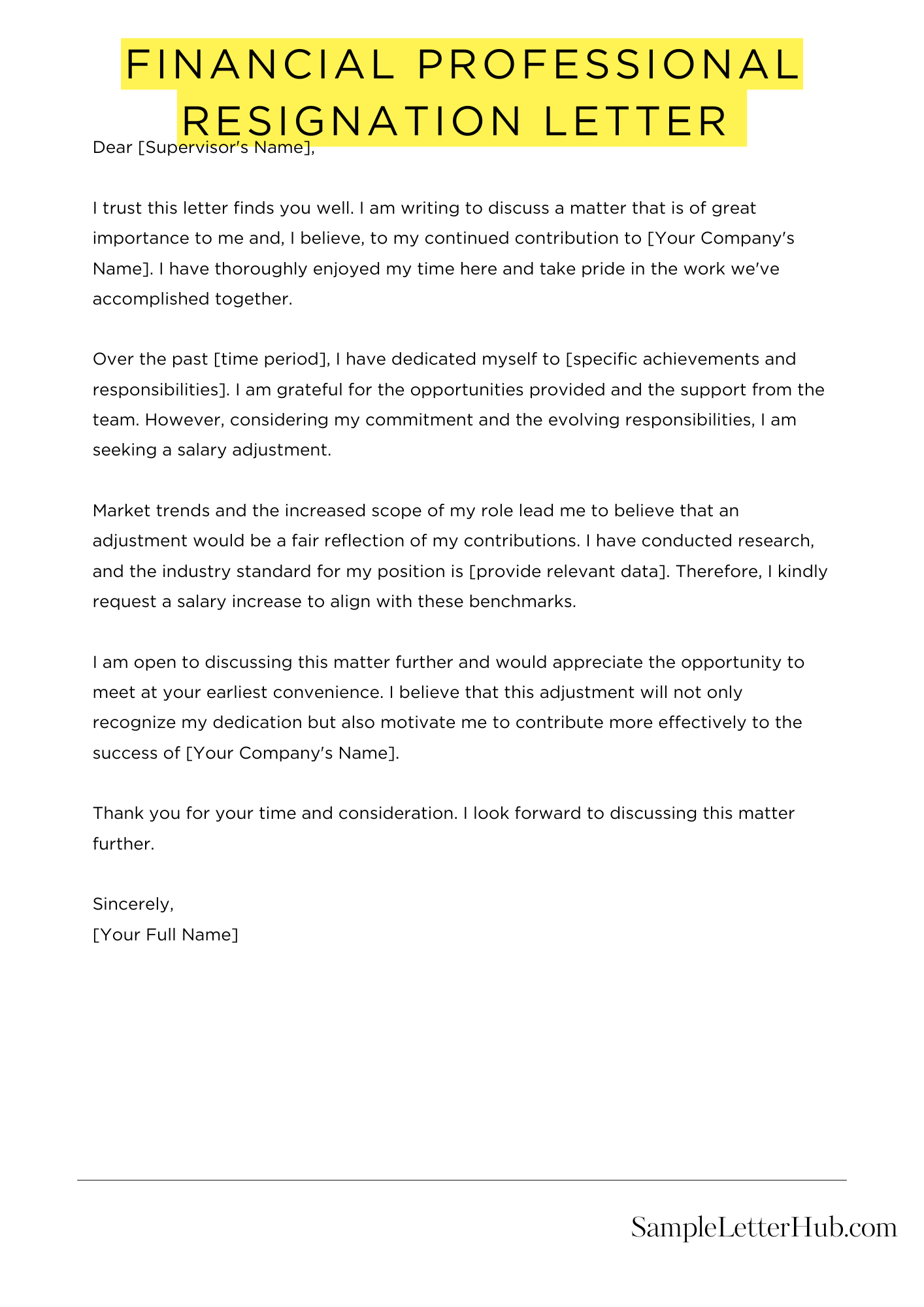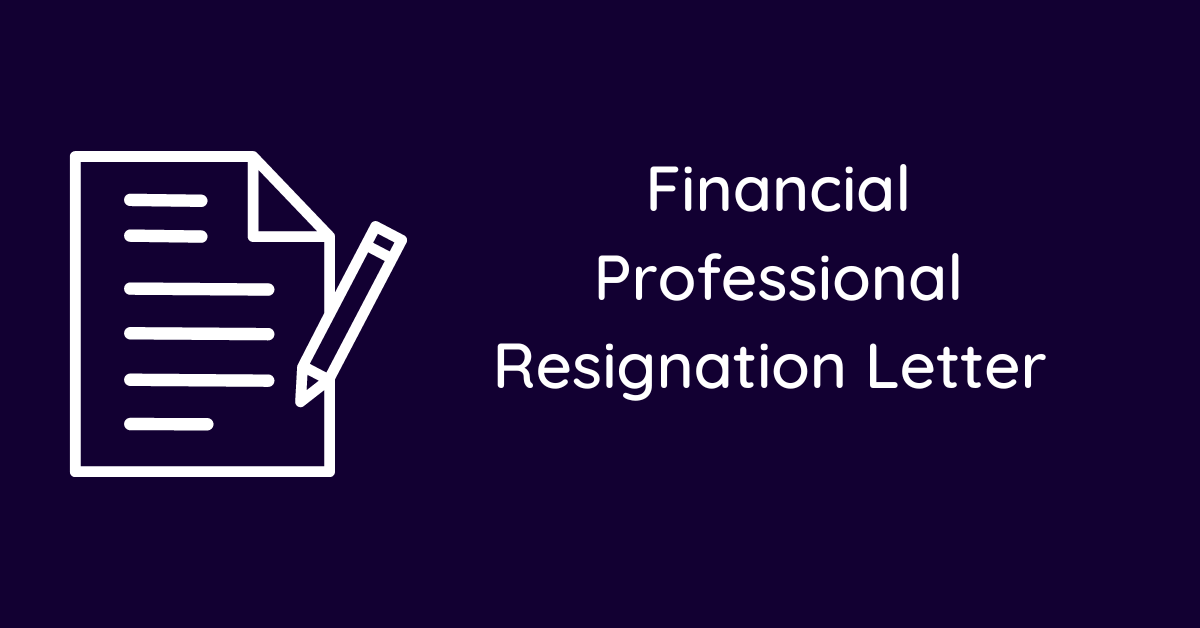When it comes to leaving a job, one way to do it is to write a clear and professional resignation letter explaining your decision to leave. This is especially important in the financial industry, where professionalism is highly valued. In this blog article, we will share an example of a financial professional resignation letter with you.
In your resignation letter, it is important to be polite and humble. Thank your employer for the opportunity to work at the company and express your appreciation for their support. You should also state your last date of employment and offer to help with the transition in any way that you can.
Below, we have shared a template/example financial professional resignation letter that you can use. Feel free to adapt it to your own needs.
Financial Professional Resignation Letter
Dear [Manager’s Name],
Please accept this letter as formal notification that I will be resigning from my position as [Your Position] at [Company Name], effective [Your Last Date of Employment].
During my tenure, I have valued the opportunities and experiences I have gained. I am grateful for the support and guidance I have received from you and my colleagues.
I wish you and the company all the best in the future.
Sincerely,
[Your Signature]
Short Financial Professional Resignation Letter Sample
Please accept this letter as formal notification that I am resigning from my position as Financial Professional at [Company Name]. My last day of employment will be [Your Last Day]. Thank you for the opportunity to grow and learn during my time here. I wish you and the company continued success. I am happy to assist in the transition process to ensure a smooth handover of my responsibilities.
I wish you all the best with your financial professional resignation letter.
When it’s time to say farewell, expressing your gratitude and best wishes can make the transition smoother:

How to Write a Financial Professional Resignation Letter
When it comes to leaving a financial institution, it’s crucial to craft a professional and respectful resignation letter. Here’s a guide to help you navigate this process:
1. Express Your Gratitude
Begin by expressing your appreciation for the opportunities and experiences you’ve gained during your tenure. Mention specific individuals or projects that have been particularly meaningful to you. This sets a positive tone and shows that you value the relationships you’ve built.
2. State Your Intent Clearly
In the second paragraph, formally state your decision to resign from your position. Include your last date of employment. Be clear and concise, avoiding vague or ambiguous language.
3. Offer Assistance During Transition
If possible, offer to assist in the transition process. This could include training your replacement or providing documentation. By showing a willingness to help, you demonstrate your commitment to the company’s well-being.
4. Maintain Professionalism
Even if you’re leaving for personal reasons, it’s essential to maintain a professional demeanor. Avoid negative comments or criticisms. Instead, focus on the positive aspects of your experience and express your best wishes for the company’s future.
5. Proofread Carefully
Before submitting your letter, proofread it carefully for any errors in grammar, spelling, or formatting. A well-written resignation letter reflects well on you and the company.
Financial Professional Resignation Letter: 6 Frequently Asked Questions
Resigning from a financial professional position can be a daunting task, and it’s important to approach it with professionalism and clarity. Here are six frequently asked questions and answers to help you navigate this process:
1. What are the essential elements of a financial professional resignation letter?
A financial professional resignation letter should include your name, position, the date you are resigning, and the date your resignation will take effect. It should also express your gratitude for the opportunity to work at the company and briefly state your reasons for leaving.
2. How much notice should I give?
The standard notice period for financial professionals is two weeks, but it’s always best to check your employment contract or company policy. If you have a particularly important project or client relationship, you may want to give more notice to ensure a smooth transition.
3. Do I need to provide a specific reason for leaving?
It’s not necessary to provide a detailed explanation for leaving in your resignation letter. However, it’s common to briefly state your reasons, such as pursuing a new opportunity, relocating, or returning to school.
4. Should I offer to help with the transition?
Yes, it’s a good idea to offer to help with the transition in your resignation letter. This shows that you’re committed to leaving the company on good terms and that you want to make the process as smooth as possible.
5. What should I do if I’m asked to sign a non-compete agreement?
Non-compete agreements are common in the financial industry. If you’re asked to sign one, it’s important to carefully review it with an attorney to make sure you understand your obligations.
6. What are some common mistakes to avoid in a financial professional resignation letter?
Some common mistakes to avoid include being negative or unprofessional, providing too much personal information, or making demands. It’s also important to proofread your letter carefully before submitting it.
Before making the decision to resign from your job, it’s essential to consider the legal aspects:
Understanding your emotions after quitting your job is important. Explore why you might be feeling sad:
Related
- Resignation letter sample
- Forced resignation letter
- Resignation letter due to going abroad
- Resignation letter due to marriage
- Resignation letter due to other opportunity
- Resignation letter due to mistake

